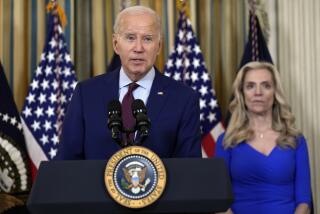Competitiveness Council, or Hit Squad?
- Share via
Members of Congress long ago learned to twist each other’s arms, if necessary, to get the votes needed to soften the impact of a piece of legislation on their hometowns.
For the most part that takes place before--not after--a bill is passed and signed by the President. But Times writer Michael Ross reported last week that a White House group is quietly playing the same sort of hardball with laws already on the books, and clean air is a prime target.
Some in Congress talk of making the group, the Council on Competitiveness, do its work in a place with fewer shadows. They have a point. At a minimum, they should investigate reports that the council is trying to sabotage the Clean Air Act of 1990.
The White House dismisses the issue as the work of Democrats sharpening their claws for an election year. But where there’s smoke, there may be pollution. And if the reports prove true, Congress would want to focus floodlights on the council’s process at once.
President Bush created the seven-member council last year, with Vice President Dan Quayle in charge. Other members include three Cabinet officers and John Sununu, chief of the White House staff. Bush asked the council and its staff of about a dozen to review regulations to make certain that benefits outweighed the costs, either for business or consumers.
That concept is perfectly sound. It is essential to keeping American industry competitive, which theoretically is the whole point of the council.
It also is a prime reason that federal agencies are required to publish proposed new regulations in the Federal Register, make a case for them and ask for public comment.
The key word here is public . A federal agency’s argument for a rule is as much in the open as an industry’s argument against it. Anyone who cares can analyze the two cases and judge which is correct.
But the council keeps few written records. Its staff has told Congress it is not obligated to explain how it operates. So it is hard to know what a recent exchange between the council and the federal Environmental Protection Agency is all about.
Earlier this year, the agency sent to the White House a draft of proposed new rules implementing the clean-air act. The council sent them back with 100 suggested changes.
What prompted the suggestions and what kind of data supports them? Outside the council, nobody knows.
The law is not clear on whether the environmental agency is obligated to accept the suggestions, but a council created and staffed by the President does not necessarily need facts to carry a lot of political clout.
But EPA Administrator William K. Reilly is said to feel strongly enough about the suggestions to force the issue. Congress may well want to tip the scales a bit in his favor so that laws enacted publicly cannot too easily be scuttled in private.
More to Read
Get the L.A. Times Politics newsletter
Deeply reported insights into legislation, politics and policy from Sacramento, Washington and beyond. In your inbox twice per week.
You may occasionally receive promotional content from the Los Angeles Times.










